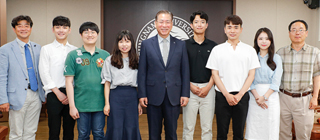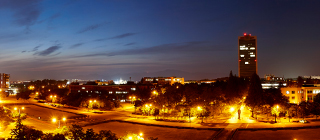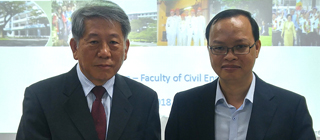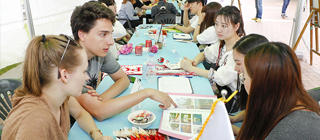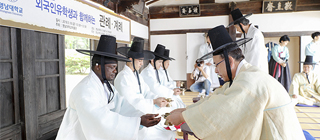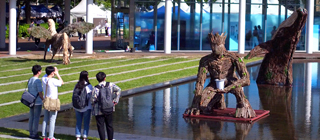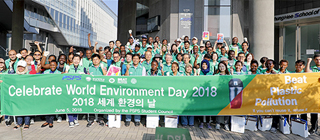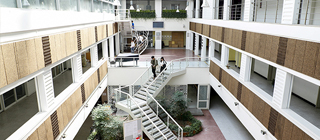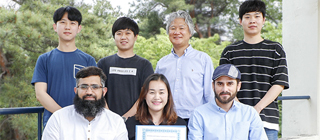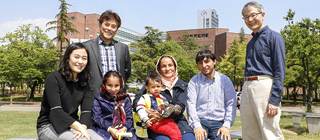-
Highest number of passers among universities in Daegu and Gyeongbuk... 4 in administration, 2 in technical 4 in 2016, 5 in 2017... Number of passes increase every year thanks to systematic support from the university [June 19, 2018] <YU graduates who passed the ‘2018 National Position Regional Talent Grade 7 Trainee Test’> (from left to right: Employment Office Director Lee Seung-woo, Park Geon-ho, CHoi Joon-young, Lee Hae-jung, YU President Sur Gil-soo, Lee Yang-hee, Lee Min-gyu, Park Jung-min, Department of Police Administration Professor Sung Do-gyeong)> YU (President Sur Gil-soo) celebrated having six people pass the ‘2018 National Position Regional Talent Grade 7 Trainee Test’. This is the highest number of passers among universities in the Daegu and Gyeongbuk regions. In this year’s test, a total of 498 students from 111 universities around the nation and 130 were selected. Six of them comprised of four in administrative and two in technical positions were from YU. In administrative positions they are Lee Yang-hee (26, graduated from the School of Economics and Finance), Lee Min-gyu (25, graduated from Department of Food Science and Technology), Lee Hae-jung (24, graduated from Department of Media and Communication), Park Jung-min (22, graduated from Department of Public Administration), and from technical positions, they were Park Geon-ho (26, graduated from the School of Mechanical Engineering), and Choi Joon-young (25, graduated from the Department of Mechanical Engineering). The number of passers from YU has been continuously on the rise from four in 2016 to five in 2017. It is judged that the systematic and assertive support by the university is resulting in such heightened competitiveness. YU helps students throughout the entire process from recruiting college recommendee to written tests and applications. Lee Min-gyu, who graduated in August of last year, said, “The regular lectures and employment study groups offered by the university help a lot. In particular, thanks to the consideration from the school and advising professor, I was able to take the official position aptitude class in the second semester of last year despite already graduating, which helped me a lot in passing the written test.” He added, “After completing the training, I would like to utilize my major next year and work at the Ministry of Trade, Industry and Energy or the Ministry of Agriculture, Food and Rural Affairs.” Around June of every year, YU offers regular lectures on written tests, etc. by recruiting students preparing for the ‘National Position Regional Talent Grade 7 Trainee Test’ and assigns an advising professor (School of Police Administration Professor Sung Do-gyeong) for individual guidance. Also, the Employment Office offers online lectures and supports employment study groups to prepare for written tests and also helps students prepare for interviews through meetings with seniors who passed the test in the past. YU Employment Office Director Lee Seung-woo said, “The secret to the high passing rate is the university’s systematic support that provides practical assistance to students preparing to enter the public sector from public position aptitude tests to final interviews.” He added, “We have displayed significantly higher passing rates not only in national position regional talents, but also for general public employee tests compared to other universities. Students who are interested in working in the public sector will receive a lot of assistance by participating in programs offered by the university.” Meanwhile, those who passed will be admitted to the National Public Employee Talent Development Center in the first half of next year and participate in a four-week program for adapting to public positions and basic training to improve work competence. Afterwards, they will work as trainees at central administrative institutes (ministries, offices, etc.). Their training period is approximately one year and after completing the work training, they will be appointed as regular public employees after receiving work execution evaluations.
-
2018 Leiden Rankings, proving world-class research capacities Overall ranking 10th in Korea, 7th in life and earth science, 15th in social science and humanities Qualitative factors such as university reputation excluded, rankings based on achievements and quality of research [May 23, 2018] The research capacities of YU (President Sur Gil-soo) were once again to be at world-class levels. YU was ranked 50th in the world and first in Korea in the mathematics & computer science sectors in the ‘2018 Leiden Ranking’ that assesses global university rankings based on qualitative levels of theses. YU was ranked in the top 50 of the world for four straight years in the mathematics & computer science sectors. When excluding YU, there is not a single Korean university ranked in the top 300, thus highlighting the research capacities of YU. The Leiden Ranking publishes rankings in five sectors such as overall ranking, mathematics & computer science, biomedical & health sciences, life & earth sciences, physical sciences & engineering, and social sciences and humanities. In the overall ranking, YU climbed up the ladder from 15th in Korea last year to 10th this year. This is due to the fact that the ratio of the top 10% thesis ratio rose from 7.1% last year to 8.1% this year. It also climbed the ranks in the life & earth sciences to seventh place in Korea, 15th in social sciences and humanities, and 19th in physical sciences / engineering, thus being recognized for the superiority of its research capacities in all fields. (based on proportion of theses in top 10% of citation frequency) The Leiden Ranking is computed based on the number of theses and the ratio of citations of theses, while excluding subjective qualitative assessment elements such as college reputation, etc. by Leiden University of the Netherlands. The Leiden Ranking computes rankings by comparing the theses in the top 10% cited theses in each academic field with the total number of theses. Therefore, it is an important index that makes it possible to judge the research achievements and quality of research of universities. It announces rankings annually since 2011 by analyzing theses of the past four years by using the database of Thomson Reuters, which is an academic information service company. This year, it evaluated a total of 938 universities around the world that published at least 1,000 international theses from 2013 to 2016. A total of 35 Korean universities including YU were named in the rankings. The Leiden Ranking mainly uses the top 10% cited theses in each academic field by the ratio comparing with all theses. The ratio of the top 10% cited theses are the main indices of the rankings, but it also announces the top 1% thesis ratio, etc. through the free database.
-
Pursuing international exchange student + internship ‘hybrid program’ MOU between ‘Department of Civil Engineering and Vietnam National University – Ho Chi Minh City University of Technology’ Currently negotiating with five Korean conglomerates in Vietnam – synergy effect for global and employment capacities [June 1, 2018] <YU Department of Civil Engineering and Vietnam National University Ho Chi Minh City University of Technology Department of Civil Engineering signed an MOU to pursue a ‘hybrid program’> YU (President Sur Gil-soo) will pursue the ‘hybrid program’, a new kind of international exchange program for students to enter other nations. The ‘Hybrid Program’ combines the advantages of existing overseas exchange student programs with that of overseas internships. Students participating in the program will first study at a local university in the first semester as an exchange student and then work in an internship at a local company in the following semester. Students will be able to become familiarized with the language, culture and lifestyle first as an exchange student and then gain on-site work experience at companies. Therefore, this is expected to create a synergy effect in terms of the global competitiveness and employment capacities for students. The first partner of the ‘hybrid program’ pursued by YU will be Vietnam. Vietnam is currently the fourth biggest trading partner of Korea and there has been a continuous increase of Korean companies entering Vietnam. Accordingly, it is expected that there will be a growing demand for local experts in regards to Vietnam and local conditions so there is growing interest on the success of this program. YU noticed the increasing demand for the construction sector in Vietnam and thus began to discuss the hybrid program with HCMUT (Ho Chi Minh City University of Technology, Vietnam National University) since last year. The two universities agreed to pursue the hybrid program first in the construction and civil engineering fields. Finally on May 28, the YU Department of Civil Engineering (Dean Lee Jong-dal) signed an MOU for the operation of the program with HCMUT. With this agreement, students of the YU Department of Civil Engineering will participate in the hybrid program from the first semester of the 2019 school year. The two universities that made this MOU will look for local companies that will participate in the hybrid program. YU External Cooperation Office Director Heo Chang-deok said, “YU signed an MOU with a prestigious national university of Vietnam and is currently holding discussions with five conglomerates that entered Ho Chi Minh City, so it is expected that this newly attempted hybrid program will sail smoothly.” He added, “We will not only strengthen the global competitiveness of students, but also plan out various globalization programs that can provide practical assistance for students to begin their professional careers such as finding jobs abroad.” The reason why a prestigious national university of Vietnam became the first partner for the YU hybrid program was due to its ties with Le Anh Tuan, dean of the HCMUT dean. Mr. Le Anh Tuan earned his PhD at the YU Graduate School of Civil Engineering in 2005 and then received his tenure as a professor at HCMUT. Last year, the YU international exchange team proposed the hybrid program and Dean Le Anh Tuan, who was always interested in exchange with his alma mater YU, assertively took the lead for exchange. HCMUT is a national university of Vietnam with 22,000 enrolled students and was founded in 1957. It is a prestigious university recognized for its educational achievements and boasts an employment rate of over 90%. In particular, among the 11 departments offered by the university, the Department of Civil Engineering is the largest with approximately 4,500 undergraduates and 250 graduate students.
-
Third YU International EXPO held on 16th and 17th 47 international students from 22 universities in 13 different countries participate to offer information on local life and culture Introduction of globalization programs, offer consulting on overseas internships and employment [May 16, 2018] YU (President Sur Gil-soo) held the ‘3rd YU International EXP’. YU has been holding the EXPO annually since 2016 to strengthen the global capacities of students. It is receiving huge interest from students as it offers information on various international programs such as overseas exchange student programs. This EXPO, which was held in front of the clock tower at the main gate of YU on the 16th and 17th, was joined by 47 international exchange students from 22 sister universities from 13 nations including France, Poland, USA, Brazil and China. At the booths provided for each university, foreign students studying at YU as exchange students and former exchange students who went abroad to study at foreign universities took part to introduce their respective nations and local universities, while also offering their first-hand experiences and practical information on living abroad, their cultures, etc. Lee Tae-joon (23, YU School of Economics and Finance, junior) said, “I am considering applying to become an exchange student in the second semester of this year. However, it was more difficult than expected to obtain information so I came to this EXPO. I am very interested in universities in the Eastern European region. I came to the EXPO and found that there are many universities from different countries, so I am gaining a lot of information here.” He added, “It was great that I could not only learn about the educational programs of local universities, but also in-company club activities, as well as public safety and everyday life.” Through this EXPO, YU offered information on various international programs such as the exchange student program, backpacking program on different themes (Window to the World), language and cultural exchange program between foreign exchange students and local students (LPP, Buddy Program), etc. Also, overseas internship agencies and college job centers also participated to provide overseas internship and employment information as well. Meanwhile, YU currently has sisterhood relations with 389 universities and institutes in 50 countries around the world and is operating international exchange programs. As of the first semester of 2018, a total of 167 YU students are studying abroad in 57 colleges in 15 countries, while 148 foreign students from 41 sister universities in 15 countries are studying at YU.
-
YU holds gwanrye and gyerye event with international students for the 'Coming-of-Age Ceremony' Experiencing traditional coming-of-age ceremonies and the charms of traditional Korean culture [May 18, 2018] <Traditional coming-of-age ceremony with international students - gwanrye> At Gugye-seowon inside of the YU Gyeongsan Campus Folk Village at 10 a.m. on the 18th, international students wearing Korea’s traditional garment called the hanbok and gat (traditional hat for men) and binyeo (ornamental hair pieces for women) became the focus of attention. YU (President Sur Gil-soo) held the 'traditional coming-of-age ceremony' event for international students for the 46th coming-of-age day (third Monday of May). A total of eight students including six international students from Uzbekistan, Kenya, Columbia and China wore traditional Korean clothes to take part in the ceremonies called ‘gwanrye’ and ‘gyerye’. Musrmonkulov Umidjon (24, junior) from Uzbekistan who enrolled at the YU School of Mechanical Engineering in 2016 said, “When a woman gets married in Uzbekistan, we have a ritual similar to the Korean coming-of-age ceremony,” while adding, “I am really interested in Korean traditional culture. I also experienced the traditional wedding ceremony at the Daegaya Museum so the hanbok is not completely new to me. I think this will be a fun memory for my time studying in Korea.” Gwanrye is a ceremony of placing three gwan, or head pieces, on men who became 20 years old and emphasizes their responsibilities to their family, relatives and country. It is completed by tying the hair up in a knot and wearing three hats, and the bunri-ceremony of changing clothes, and is completed with a drink of alcohol and announcing to the heavens that one has become an adult. It also includes the myeonjarye ritual of giving an 'alias' to be used instead of one's name as a symbol of protecting one's body and name that was given to them by their ancestors. Gyerye is a ceremony of untying a girl's hair and placing a binyeo, which is an ornamental hair piece, in the hair to announce that a girl has become a woman. <Traditional coming-of-age ceremony with international students - gyerye> At the coming-of-age ceremony, YU President Sur Gil-soo was invited as the big elder for the first ceremony of 'gwanhonsangje' and recited a speech to congratulate male students who became 20 years old, and placed the three hats of chipogeon, yugeon and finally the gat, and tied the strings to officially announce their adulthood. President Sur Gil-soo, who watched the traditional coming-of-age ceremony from start to finish, said, "I hope that you will think about the meaning of becoming an adult by participating in the traditional gwanrye and gyerye events," while adding, "I hope that especially for international students, it will be a great memory and an opportunity to gain deeper insight into Korean culture." 'Coming-of-Age Day' falls on the third Monday of May and is a day to naturally remind young adults who became 20 years old of their responsibilities and duties, while congratulating their physical and mental maturation as a young adult.
-
-
-
School of Architecture saves 10 million won annually in power costs through the energy conservation campaign Looking to install ‘solar power generator’ with national funding... Taking the initiative for constructing a green campus “Need participation of everyone to create an energy-saving, eco-friendly campus” [May 29, 2018] <YU Mechanical Facility Situation Room> The YU School of Architecture (Dean Kwon Jong-wook) is reaping fruit from its energy conservation activities. The YU School of Architecture engaged in various energy conversation campaigns for students and faculty, which resulted in saving 24% of energy compared to the previous year (2016). When converting to annual electrical costs, this is a saving of more than 10 million won. The School of Architecture held regular meetings for professors, administrative office and student government and reached an agreement that it is necessary to conserve energy in the school. Through this, they began participating in energy-conservation activities in everyday life such as avoiding use of the design lab in late hours, turning off lights in classrooms when empty, avoiding unnecessary use of computers in the design lab, recommending limited use of heating and cooling facilities, attaching energy-saving stickers, disconnecting power cords for hot water in restrooms during the summer, etc. In result, energy consumption at the Architecture Hall (including the College of Engineering) dropped significantly from 204tCO2e (units converting electric power usage into carbon emissions) in 2016 to 156tCO2e in 2017. <See carbon dioxide emissions table below> <School of Architecture (Architecture Hall) energy consumption> ※ The above data is the conversion of electric usage into carbon emissions and it is information for constructing an eco-friendly campus by conserving energy and resources. The School of Architecture took another step to take the initiative for constructing a green campus. The School of Architecture was selected for the 2018 Renewable Energy Distribution (Building Support) project hosted by the Korea Energy Corporation. Through this project, the School of Architecture will install an annual 25MWh solar power generator using funds of 43 million won including 18 million won from national funding and from the development fund for the School of Architecture. It is estimated that this will save an annual 2.6 million won. YU Facilities Management Office Director Kim Moon-jae said, “We hope that in addition to our energy element tracking management, database construction and other activities, all of the members of the university will voluntarily participate in various energy conservation activities.”
-
Department of Information and Communication Engineering Professor Park Yong-wan’s research team participated in the smart-phone based localization system construction Recognized for world-class in indoor localization system-based technologies Large marketability such as expandability so expected to be used by both individuals and industries [May 29, 2018] <Department of Information and Communication Engineering Professor Park Yong-wan’s research team who took third place at the '2018 Microsoft Indoor Localization Competition'> (From bottom left: Muhammad Usman Ali, Heo Su-jeong, Ashraf Imran; from top left: Lee Chan-seok, Sohn Hee-dong, Professor Park Yong-wan, Kang Min-gyu) The indoor localization system developed by a research team from YU took third place in an international indoor localization competition hosted by Microsoft. At the 2018 Microsoft Indoor Localization Competition hosted by Microsoft in Porto, Portugal from April 10 to 11, Professor Park Yong-wan (57) of the YU Department of Information and Communication Engineering), Professor Heo Su-jeong (40) of the BK21+ project team, and graduate school students Muhammad Usman Ali (38, completed PhD course), Ashraf Imran (35, completed PhD course), Sohn Hee-dong (26, second semester in master’s degree program), Kang Min-Gyu (26, second semester in master’s degree program), and undergraduate student Lee Chan-seok (25, Department of Information and Communication Engineering, senior) won third place. This contest is on measuring the accuracy of real-time indoor position recognition systems. This is the fifth competition since first being held in Berlin, Germany in 2014. It is hosted and sponsored by global companies and research institutes such as Microsoft, Google, Intel, Bosch, and Carnegie Mellon University showing the global interest on indoor localization technologies. A total of 33 teams from 15 countries around the world participated in the first sector (2D localization) on smart-phone based localization system construction and the second sector (3D localization) on localization systems based on sensors. On the first day, lab environments were constructed and the stadium was analyzed and on the second day, locations were checked in real-time at the point designated by the host. The first sector that the YU team participated in was on measuring 2D location using smart phone sensor information and data in an environment without additional infrastructure. The contest was carried out by checking the location error of the localization system while freely walking 300 to 400 meters for about 15 minutes on the first and second floor of the Bolsa Palace in Porto, Portugal. The YU team exhibited a system of sending user location information confirmed through the Earth’s magnetic field sensor, Wifi, and walking navigation algorithms through a smartphone application that it developed. The YU team took third place from a total of 13 teams that participated in the first sector with a location accuracy of 3.2m, which was just 0.9m lower than the Israeli team that took first place. In particular, the technology developed by the YU research team received good reviews from participants for its expandability in terms of indoor localization system technologies and marketability. The research team said, “When using a smart phone camera and walking navigation localization, accuracy can be improved, but the power consumption of smart phones is high and there are also problems that real-time location information cannot be guaranteed in large indoor environments such as shopping malls due to the size of the data.” They added, “The YU research team solved the issue with unstable radio wave resource localization in indoor environments with the Earth’s magnetic field. After precisely setting the initial location with Wifi, this technology cannot provide real-time user location and therefore, it is the most suitable technology for constructing indoor navigation systems of smart phone users.” Recently, buildings are growing in size due to skyscrapers and shopping complexes, and underground spaces are also expanding with the development of subways. Therefore, indoor navigation is receiving attention as a core future technology and is expected to have significantly more uses and hence, the research results of the YU research team are receiving more attention. Professor Park Yong-wan who headed the research team said, “This proved that indoor location system-based technology possessed by YU is at a world-class level. YU’s technology, which was a runner up in last year’s ‘IPIN 2017’ procured both B2C and B2B marketability and it can thus be used as core technologies for the fourth industrial revolution.”
-
International student from Afghanistan Bashir’s daughter regains health with help of YU Help offered by YU Medical Center, Korean Red Cross, Sooryeon Rotary Club, etc. Visited YU and thanked in Korean... Wrote letter of appreciation “We will continue our ties with YU and Korea that gave new life and hope to our family” [May 11, 2018] <Bashir family studying at the YU Park Chung Hee School of Policy and Saemaul and faculty members> (From first on right Park Chung Hee School of Policy and Saemaul Kim Dean Gi-soo, Mr. Bashir, second from left Farzanah) “I never imagined that while studying in Korea I would be able to receive treatment for my sick daughter. Our entire family found happiness thanks to YU.” A 13-year-old girl with a disability from Afghanistan made news after regaining her health after an operation in Korea with the help of various institutes including YU. This is the story of the daughter of Mahmoodi Mohammad Bashir (31), who is currently studying at the YU Park Chung Hee School, and her name is Mahmoodi Farzanah (13). Miss Farzanah broke her leg during a C-section when she was being born in Afghanistan in March of 2005. After birth, she had complications such as osteoporosis and recurring fractures, but she was unable to receive proper treatment and ended up with a disability in her hip joint. Doctors and medical professionals recommended surgery and treatment in Afghanistan, but she was unable to receive the proper treatment due to various circumstances including financial difficulties. And then in March of last year, her father, Bashir, was selected as a scholarship student for the YU Park Chung Hee School official development aide (ODA). Mr. Bashir said, “I felt very sorry to leave my disabled daughter to come study in Korea. Even while studying, I was always worried about my daughter. I had a good relationship with YU professors and employees and we talked a lot, and one day I talked about my daughter. It was more than enough to just listen to me and give their console. When I later learned that they sought for help for daughter, I was very thankful.” After this statement, he took a long pause. Professors and employees at the Park Chung Hee School of Policy and Saemaul who learned about this looked for ways to give help. In January, a miracle happened when someone made a phone call to YU offering help. In fact, numerous institutes decided to help. The YU Medical Center, Korean Red Cross, and the Daegu Sooryeon Rotary Club notified that they would provide full costs for treatment. On March 26, Farzanah received a bone physeal plate suppression operation at the YU Medical Center. The operation was successful and she is currently recovering. Farzanah said, “I always missed my father who was studying in Korea. I never even imagined that I would be able to receive an operation in Korea where my father is studying. I want to run around and play with father now.” In the afternoon of May 10, Farzanah visited the YU Park Chung Hee School of Policy and Saemaul. She wanted to express her thanks to everyone who helped her. She said that she wanted to thank them in Korean. Farzanah, who came healthy, said thanks in quite accurate Korean. She also gave a letter that she wrote over night. Her appreciation to everyone who made it possible including YU Medical Center and the YU professors and employees was filled in this letter. YU Park Chung Hee School of Policy and Saemaul Administration Officer Choi Jung-ho said, “I didn’t expect her to thank us in Korean. I think this was the most fulfilling day while working at YU. I hope that Bashir’s family will have great memories about Korea when they return to their home country.” Bashir stated, “I am already excited about the new life that I will live with my healthy daughter once I graduate and return to Afghanistan. I hope to continue my relationship with YU and Korea that gave new life and home to our family.” Meanwhile, Farzanah was released from the hospital in April and is currently receiving treatment as an outpatient. She is scheduled to return to Afghanistan in mid-May. Her father Bashir is scheduled to graduate from the YU Park Chung Hee School in August of this year. YU Medical Center also agreed to provide support for continuous tracking and monitoring considering the fact that Farzanah is still growing. Even after Farzanah returns to Afghanistan, treatment will be provided remotely by taking x-rays in Afghanistan and sending the documents and data to the YU medical staff.
